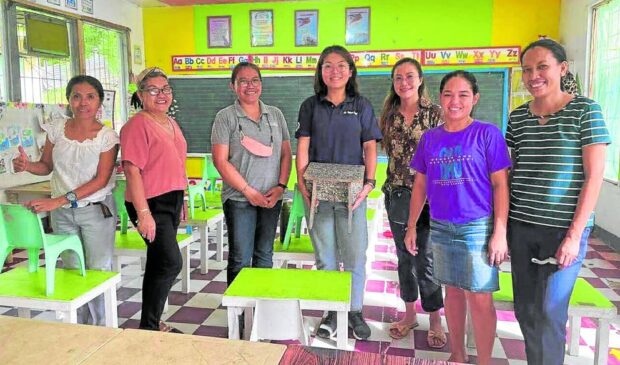
SUSTAINABILITY PUSH Cartons of Communities launch in Bukidnon —CONTRIBUTED PHOTOS
Think twice before slinging an empty Tetra Pak carton straight into the bin because with recycling and technology, that trash can be used in making school chairs.
Responsible recycling is the highlight of the Cartons for Communities program created by packaging solutions company Tetra Pak with its beneficiary Del Monte Foundation, the corporate responsibility arm of food and beverage giant Del Monte Philippines. The partnership was recently formalized via a memorandum of understanding signing.
In line with Tetra Pak’s sustainability advocacy, Cartons for Communities was recently launched in Bukidnon province. The program aims to educate the local government, schools and private communities on how recycling used beverage cartons (UBC) contributes to the country’s circular economy, with the steady cooperation of collection partners and junk shops.
Catherine Chua, Tetra Pak Philippines sustainability manager, explains how the project is being implemented in the cities. The initiative spans across Luzon, mostly in the National Capital Region and Calabarzon.
“We initiate a meeting with the local government to discuss their current solid waste management practices, and conduct field visits to observe existing systems such as materials recovery facilities and segregation practices,” Chua says. “Based on our assessments, we work on integrating UBCs into the existing waste management system.”
The Cartons for Communities program also engages with schools through parent-teacher consultations and alternative class programs.
“For schools, we contact the school administration … Then we provide information and education communication materials, and specialized bins made from recycled cartons to start the collection,” Chua says.
Founded in Sweden and with headquarters in Switzerland, Tetra Pak is present in 160 countries including the Philippines.
Community engagement
At its core, Cartons for Communities is an awareness program on collection, recycling and conversion, and it needs the help of the community that uses the cartons.
There are nine school beneficiaries. In Bukidnon, representatives from Tetra Pak and the Del Monte Foundation visited the schools and identified that the students need kindergarten chairs and tables the most.
“The recycling process and the amount of UBCs required for production can vary significantly based on several factors,” Chua says.
Here’s how it works. The collected cartons are turned into UBC chipboards and Poly Al boards, a kind of polyethylene aluminum board developed by PolyAl Pro PH, the official recycler of Tetra Pak Philippines. These boards are claimed to be “more durable and sturdier than plywood,” thus making them a good material for everyday items like tables and chairs.
All the collected UBCs are sent to Tetra Pak’s recycling partner, Rural Industrial, in Bulacan.
But how does a carton become a chair?
Chua says the number of UBCs needed for one chair depends on factors such as the recycling process efficiency, type of packaging material, size and quality of board produced.
“In PolyAl board production, only 25 percent of the UBC is utilized because the pulp extracted from the containers is recycled into paper products,” Chua says. “Recycled UBC chipboards use 100 percent of the UBC because there is no separation of layers during the production process.”
She adds, “Different chair designs may have varying material demands. For reference, a 12-millimeter 100-percent UBC chipboard typically weighs around 50 kilograms. To put this into perspective, it’s equivalent to recycling approximately 1,400 pieces of Tetra Brik Aseptic 1 Liter Slim.”
The first shipment of recycled boards for tables and chairs will be delivered to the Del Monte Foundation in October. The project is expected to be completed early next year, says Chua.
Urban recycling
To teach environmental responsibility among students, Tetra Pak is also holding an inter-school competition where participants compete to collect the most number of UBCs. Around 100 schools are expected to join, Chua says, and the winning school will receive a cash prize for its environmental stewardship.
For residents living in condominium properties, Chua says Tetra Pak liaises with the head office and property management offices to distribute educational materials through communication channels like Viber and Facebook groups. There are also incentive programs for the housekeeping staff to maintain the bins. Instructional posters are also put up in common areas.
Asked about the challenges in the recycling system in the Philippines, Chua says, “The Philippines, like many other countries, faces both opportunities and challenges in implementing effective recycling systems.”
“Collaboration involving various stakeholders, including consumers, local governments, waste management authorities and the recycling industry allows us to leverage the strengths and expertise of different stakeholders, creating a more sustainable and effective recycling ecosystem,” Chua says.
So next time you finish a carton of drink, perhaps look for a recycling opportunity within your community.